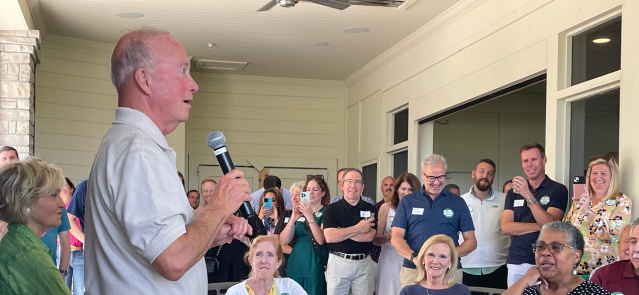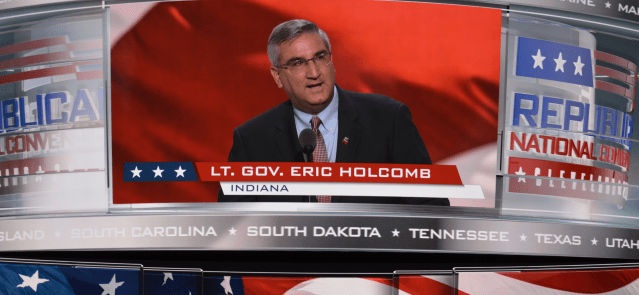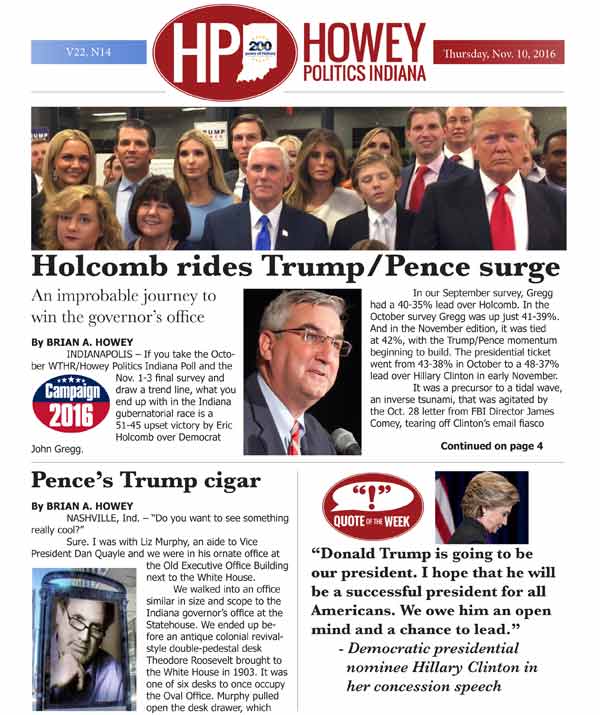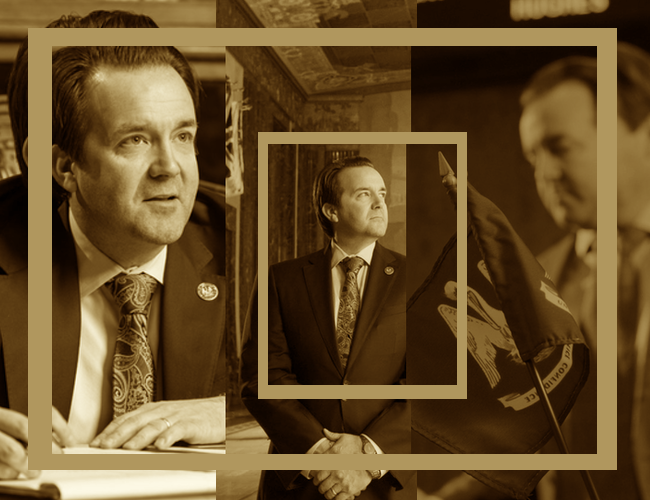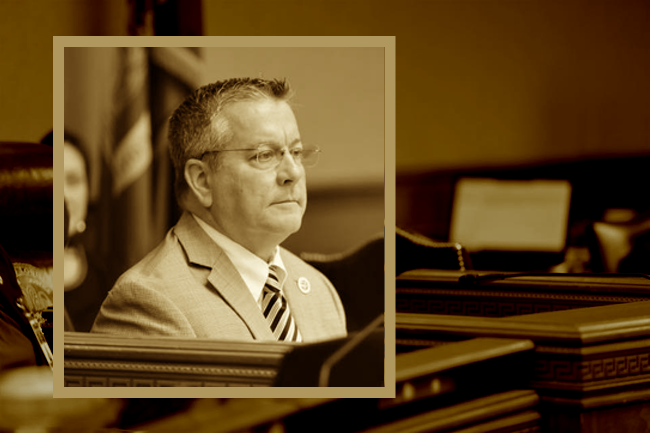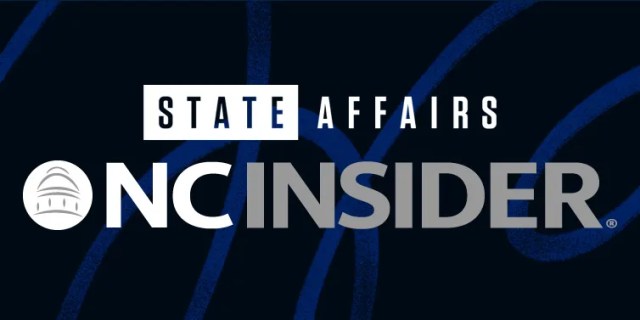YOU DON’T SAY
“A lot of people want access to cannabis.”
Qualla Enterprises General Manager Forrest Parker, on the Cherokee Marijuana farm. (Asheville Citizen Times, 8/14/24)
Trump Rally
Bill Barrow, The Associated Press, 8/14/24
Donald Trump made little effort to stay on message Wednesday at a rally in North Carolina that his campaign billed as a big economic address, mixing pledges to slash energy prices and “unleash economic abundance” with familiar off-script tangents on Democratic nominee Kamala Harris’ laugh, the mechanics of wind energy and President Joe Biden’s son.
The 75-minute speech featured a litany of broad policy ideas and even grander promises to end inflation, bolster already record-level U.S. energy production and raise Americans’ standard of living. But those pronouncements were often lost in the former president’s typically freewheeling, grievance-laden speaking style as he tries to blunt the enthusiasm of Harris’ nascent campaign.
Trump aired his frustration over the Democrats swapping the vice president in place of Biden at the top of their presidential ticket. He repeatedly denigrated San Francisco, where Harris was once the district attorney, as “unlivable” and went after his rival in deeply personal terms, questioning her intelligence, saying she has “the laugh of a crazy person” and musing that Democrats were being “politically correct” in trying to elevate the first Black woman and person of south Asian descent to serve as vice president.
When he was focusing on policy, Trump pledged to end “job-killing regulations,” roll back Biden-era restrictions on fossil fuel production and investments in green energy, instruct Cabinet members to use “every tool” to “defeat inflation” within the first year of a second term and end all taxes on Social Security benefits and income classified as tips. Specifically, he pledged to lower Americans’ energy costs by “50 to 70%” within 12 months, or a “maximum 18 months.”
But he immediately hedged: “If it doesn’t work out, you’ll say, oh well, I voted for him and he still got it down a lot.”
Trump spoke at Harrah’s Cherokee Center, an auditorium in downtown Asheville, with his podium flanked by more than a dozen American flags and custom backdrops that read: “No tax on Social Security” and “No tax on tips” — a scene that seemed to project the policy heft his campaign wanted Trump to convey.
Republicans had been looking for him to focus more on the economy than the scattershot arguments and attacks he has made on Harris since Democrats shifted to her as their presidential nominee. Twice in the past week, Trump has virtually bypassed such opportunities, first in an hourlong news conference at his Mar-a-Lago estate in Florida, then in a 2 1/2-hour conversation on the social media platform X with CEO Elon Musk.
Yet throughout his speech, Trump ping-ponged between his prepared remarks and familiar attacks — deviating from the teleprompter in the middle of explaining a new economic promise when something triggered another thought. He ticked through prepared remarks crisply and quickly. The rest was his more wide-ranging style, punctuated with hand gestures and hyperbole.
The latest attempt to reset his campaign comes in the state that delivered Trump his closest statewide margin of victory four years ago and that is once again expected to be a battleground in 2024.
Trump aides have long thought that an inflationary economy was an albatross for Democrats this year. But the event in Asheville only amplifies questions about whether Trump can effectively make it a centerpiece of his matchup against Harris.
The speech came the same day that the Labor Department reported that year-over-year inflation reached its lowest level in more than three years in July, a potential reprieve for Harris in the face of Trump’s attacks over inflation.
A Harris aide said Wednesday that the vice president welcomes any comparison Trump is able to make.
“No matter what he says, one thing is certain: Trump has no plan, no vision, and no meaningful interest in helping build up the middle class,” communications director Michael Tyler wrote in a campaign memo. [Source]
Election Polls
Will Doran, WRAL News, 8/14/24
Donald Trump is now trailing behind Kamala Harris in North Carolina and several other key swing states in the race for president, according to a new poll released Wednesday by the nonpartisan Cook Political Report.
It’s the first major poll of this election cycle that shows the Republican former president trailing his Democratic challenger in North Carolina. It was released the same day Trump gave a speech in Asheville, and just days after his campaign bought its first television ads in North Carolina — signs that the Trump campaign now sees North Carolina as being in play.
Trump was routinely favored over President Joe Biden in polls before Biden dropped out of the race on July 21. Multiple polls this spring and summer showed Trump up by nearly double digits over Biden in North Carolina. That was a stark contrast to 2020, when Trump won the state by just 1.5% of the vote.
But the Cook Political Report poll on Wednesday found Harris leading Trump by 2 percentage points — a 10-point swing in favor of Democrats from May, when its poll that month found Trump leading Biden by 8 points.
The poll of seven key swing states — North Carolina, Georgia, Arizona, Nevada, Pennsylvania, Michigan and Wisconsin — found Trump ahead in only Nevada.
“Harris’ success in closing the gap is driven by her consolidation of the Democratic base, and increased support among independent voters,” wrote Amy Walter, the group’s publisher.
Ahead of Trump’s speech in Asheville, local Democratic state Rep. Caleb Rudow told WRAL that when Biden was still in the race, the Buncombe County Democratic Party in Asheville had 20 volunteers. A week after Biden dropped out and endorsed Harris, he said, they had 140 volunteers.
“It’s seven times the number of volunteers out,” Rudow said. “And in states like North Carolina, where everything is really close, seven times the amount of energy makes a really big difference in elections.”
Harris plans to visit Raleigh on Friday, countering Trump’s Asheville visit.
Wednesday’s poll wasn’t the first sign that Harris’s candidacy has energized Democratic voters in North Carolina. A Morning Consult/Bloomberg poll conducted in late July showed Harris trailing Trump by one percentage point, gaining ground on the lead Trump held over Biden. And 65% of Black voters said they were more likely to vote now that Biden is no longer the Democratic nominee.
With North Carolina now appearing politically competitive once more, on Wednesday the GOP nominee for governor said his party has the winning message on the economy — always a key issue come election time.
Republican Lt. Gov. Mark Robinson spoke in Asheville on Wednesday before Trump took the stage. He claimed to recently convince one Harris supporter to switch to Trump, by talking about inflation and the economy.
When she visits Raleigh on Friday, Harris is expected to roll out her own economic plan. It could set the tone for how much she plans to either continue Biden’s policies, or propose a new path forward. [Source]
School Bibles
T. Keung Hui, The News & Observer, 8/14/24
Newly released audio shows Michele Morrow, the Republican nominee to lead North Carolina’s public schools, wants Bible classes offered in every middle school and high school in the state.
A representative from a progressive super PAC approached Morrow at last month’s Republican National Convention to ask her about public schools teaching the Bible. Morrow responded by advocating having Bible elective classes in all secondary schools.
“I absolutely believe that we need to get elective Bible classes back in every middle and high school,” Morrow said in audio posted Tuesday morning by American Bridge 21st Century, a Democratic super PAC.
American Bridge used the audio to criticize both Morrow and Lt. Gov. Mark Robinson, who is the GOP nominee for governor.
“While Michele Morrow might not want to talk to reporters, she’s making it clear to presumed supporters that she wants to push the Bible and Christianity on North Carolina’s children regardless of their religious background,” Philip Shulman, a spokesperson for American Bridge, said in a statement. “Michele Morrow and Mark Robinson have shown a disdain for religious freedom and, if given the chance, will push Christian nationalism as far as they can in North Carolina.”
Morrow is a homeschool parent, conservative activist, registered nurse and former Christian missionary who upset incumbent Catherine Truitt in the March GOP primary for state superintendent of public instruction.
She is running against Democrat Mo Green, the former superintendent of Guilford County Schools, and former executive director of the Z. Smith Reynolds Foundation, a group that funds progressive causes.
Morrow made national headlines after CNN reported on her past social media posts that talked about killing former President Barack Obama and encouraged President Donald Trump to use the military to stay in power in 2021. She has accused CNN of “gaslighting the public.”
Morrow’s campaign did not respond to an email from The News & Observer asking for more information on what she wants to be taught in the Bible classes.
In an interview Tuesday with WRAL, Morrow said she wants to ensure students can study the Bible. “It’s in our bylaws in North Carolina that if we wanted to study the Bible in terms of a historical text or because of legislative reasons or whatever it might be, that that could be an elective that students could choose to take if they wanted to take that,” Morrow told WRAL. “So I just want to expand that opportunity.” [Source]
Abortion Policy
Dawn Baumgartner Vaughan, The News & Observer, 8/14/24
Progressive clergy in Raleigh are criticizing the Republican candidate for governor, Lt. Gov. Mark Robinson, for his comments about women, LGBTQ+ people and what they describe as Christian nationalism. And they are questioning Robinson’s apparent change of heart on the issue of abortion.
“Honestly, I have no faith in Mark Robinson’s new commitment to uphold the state’s current abortion law allowing access up to 12 weeks,” the Rev. Chalice Overy said. “And the reason I have no faith in this is because Mark Robinson has given no explanation of what has sparked his change of heart from earlier in the year, when he outlines a plan to get it down from 12 weeks to six weeks, and then go on from there,” she said.
Overy, associate pastor at Pullen Memorial Baptist Church, said Robinson has “continually shown a disregard for the dignity and freedom of women, in particular, but a whole lot of groups.” She said that he does not represent all Christians.
Overy and other clergy spoke at a news conference Thursday in front of the N.C. Legislative Building organized by Progress NC Action.
The same group held an event with clergy in Greensboro, criticizing Robinson.
Overy referenced a new television ad in which Robinson says he will “stand by” the current abortion law, which bans abortion with exceptions after 12 weeks. That is a stark change from what his campaign described as his position only months ago, and what he has said for the past several years.
In the ad, Robinson and his wife talk about their “very difficult decision” to have an abortion 30 years ago, one that became a “silent pain between us that we never spoke of.” Robinson said that is “why I stand by our current law, and it provides common-sense exceptions for the life of the mother, incest and rape. Which gives help to mothers and stops cruel late-term abortions. When I’m governor, mothers in need will be supported.”
Robinson’s Democratic opponent in the governor’s race, Attorney General Josh Stein, has been airing an attack ad against Robinson featuring what he has said about abortion, including that women should keep their “skirt down.”
Asked for a response on the criticism of Robinson for his changed abortion stance, LGBTQ+ comments and Christian nationalism, Robinson’s campaign called Progress NC Action “completely out of step with the people of North Carolina.” [Source]
Antitrust Lawsuit
Ray Gronberg, Business NC, 8/14/24
A Fourth U.S. Circuit Court of Appeals panel recently handed Duke Energy a loss, reinstating a competing power provider’s antitrust lawsuit against it and instructing the trial judge who’s been handling the case to step aside. Authored by Fourth Circuit Judge Paul Niemeyer, the unanimous ruling held that there are “genuine issues of material fact” at stake that merit sending the court battle between Duke and NTE Energy to a jury.
That overturned earlier rulings from the trial judge, Trump appointee Kenneth Bell, who sided with Duke. Bell won’t preside over the case on remand, as Niemeyer and his colleagues ordered his removal from the litigation.
The Wake Forest-trained Bell had recused himself early in the case because a former law partner was representing Duke, but he returned to it after another judge also recused.
Though the previous conflict had been eliminated, Fourth Circuit precedent is that once a judge recuses from a case, he or she is out of it for good.
That “bright-line rule can be applied with ease and promotes the goal of ensuring public confidence in the impartiality of the judicial process,” said Niemeyer, a George W. Bush appointee to the Fourth Circuit bench.
The antitrust case concerns Duke’s response to competitive pressure from NTE, which in the 2010s built a gas-fired power plant near Kings Mountain and started selling electricity to a set of nine former Duke customers that included Western Carolina University. Aside from any prestige factor, Duke’s problem was the NTE’s facility and the follow-up it wanted to build near Reidsville were “more cost-efficient than Duke’s own plants,” Niemeyer said.
Duke nonetheless had most of its customers signed to long-term contracts that kept them from jumping ship.
Fayetteville was a major exception, with a supply deal that was set to expire in 2024, and it quickly became the major battleground for the two companies. Duke secured that flank in 2019, when it signed a new deal with the city. The company served up a discount on the remaining years of its predecessor contract, and agreed to pay a premium for excess electricity buys from what Niemeyer termed Fayetteville’s “very inefficient” Butler-Warner Generation Plant.
Being the newcomer, NTE wasn’t able to offer Fayetteville a discount on the last three years of its existing contract with Duke.
Moreover, there’s evidence Duke’s “blend and extend” strategy involved charging higher prices than need be so that it could offer discounts when the need arose, Niemeyer said. And company internal documents also told of a plan to “raise prices on other of Duke’s wholesale and retail customers to make up for the profit it lost on the Fayetteville deal,” Niemeyer said.
Meanwhile, the competitors were also at loggerheads about the Reidsville plant, which NTE reckoned would become the source of the electricity it would sell Fayetteville if it won that city’s business. The Reidsville plan stalled and Duke bumped it from the queue for a slot on its power-transmission network.
The key legal issue in the case is that Duke contends that all of its actions were “lawful in themselves,” and thus it couldn’t have committed an anti-trust violation. Bell agreed.
But writing for an appeals panel that also included Judges Stephanie Thacker (an Obama appointee) and Diana Motz (a Clinton appointee), Niemeyer said the Supreme Court has long recognized that a string of otherwise legal actions can add up to an antitrust violation when they serve an anti-competitive plan.
The facts supporting the parties’ conflicting positions, we conclude, are fairly disputed and therefore require a trial to resolve,” Niemeyer said. [Source]
PFAS Regulation
Peter Castagno, Port City Daily, 8/14/24
Environmental issues are a core theme of Sen. Michael Lee’s, R-New Hanover, 2024 reelection campaign. Port City Daily reached out to the senator’s office multiple times in the last week to ask for his response to environmentalists’ recent criticisms of his PFAS record; his team responded with a list of bills and accomplishments.
The senator’s office cited Lee’s leading role in appropriating funds for PFAS mitigation in local infrastructure, passing legislation, such as the Water Safety Act of 2018, and providing nearly $50 million to fund academic research through the NC Collaboratory. This is an organization that coordinates with state universities and governments to facilitate research that informs the state’s policy-making process.
Lee’s campaign expanded on his PFAS position in an advertisement that launched last month: “Senator Michael Lee took action. Holding polluters accountable, protecting us from harmful chemicals. Michael Lee delivered uniting scientists, engineers, and new technologies to clean our water. Pioneering solutions so impressive they’ll be used around the world.”
However, environmentalist groups including Clean Cape Fear, the Natural Resource Defence Council, the Southern Environmental Law Center and the North Carolina League of Conservation Voters argue Lee’s legislative record contradicts the claims of his campaign.
“The North Carolina General Assembly has yet to enact any legislation that would stop PFAS from getting into our environment in the first place, or to hold polluters responsible for the harm they have caused and continue to cause,” SELC legislative counsel Brooks Pearson told Port City Daily.
Clean Cape Fear — a Wilmington-based nonprofit co-founded by former mayor and state senator Harper Peterson, who competed against Lee in the 2018 and 2020 elections — criticized Lee’s recent PFAS ads in an article earlier this month. The group argued Lee should have leveraged his position as one of the state’s most influential lawmakers to advocate bills creating PFAS regulatory limits and liability.
The Water Safety Act of 2018, introduced by Lee, provided the first $5 million tranche to the North Carolina Collaboratory — Lee’s legislative efforts in 2021 and 2023 brought the total figure to around $50 million — as well as $2 million to help local governments connect residents to water utilities and $450,000 to Cape Fear Public Utility Authority to evaluate PFAS testing and treatment technologies.
The bill also authorized the governor to shut down companies like Chemours if unauthorized pollution does not stop. But critics, including Clean Cape Fear’s co-founder Emily Donovan, Duke University director of Environmental Law Ryke Longest, and the DEQ argue the bill did not actually expand or improve the state’s power to regulate polluters.
“Senate Bill 724 makes existing enforcement against Chemours plant harder, allocates millions of dollars to agencies with no enforcement authority, and creates uncertain liability for intermediaries who have treated wastewater from homes, businesses and military bases,” Longest wrote in a 2018 Fayetteville Observer op-ed.
Clean Cape Fear partnered with Duke University public policy researchers for a December 2023 study — “Examining North Carolina’s Insufficient Response to PFAS Contamination in Water Supplies” — that analyzed recent PFAS legislation and cited local legislators Lee, Rep. Davis Jr., R-New Hanover, Rep. Frank Iler, R-Brunswick, and Deb Butler, D-New Hanover, among state leaders on the issue.
The study categorized lawmakers that support or detract from PFAS limits in North Carolina. Lawmakers who pushed for bills focused on enforceable PFAS limits and corporate accountability were deemed “supporters”, while those who sponsored “less effective” bills focused on issues such as research grants were regarded as detractors. Lee was put in the latter category.
Donovan emphasized a provision in Senate Bill 658, sponsored by Lee last year, that would have funded a training facility for firefighters using PFAS-containing foam. New Hanover County Professional Firefighters Association president Benjamin Bobzien criticized the bill for turning firefighters “into human guinea pigs.”
“He’s not paying attention,” Donovan said. “He’s just rubber-stamping whatever is handed to him from God knows whoever is handing it to him. And then doing these really beautiful campaign ads, gaslighting our community that he’s a champion for us. No, this is total smoke and mirrors.”
Donovan, Pearson, and other environmentalists lauded scientists involved in the collaboratory for PFAS research and monitoring. However, the Clean Cape Fear co-founder raised concerns about leadership’s influence on research priorities — such as research and development for novel removal technologies that would benefit companies like Chemours — rather than seeking community input to use resources for immediate needs.
The organization’s executive director, Jeffrey Warren, is the former scientific adviser of Sen. Phil Berger.
Rep. Pricey Harrison, D-Guilford, told NC Newsline in 2016 that she could not think of anyone who has had a more negative impact on the state’s environment than the collaboratory leader.
“Academic groups are supposed to be independent of political influence,” Donovan said. “The presence of someone like Jeff Warren does not instill confidence for many of us in the community.”
2015 emails obtained by investigative reporter Lisa Sorg show Warren assured Reidsville and Greensboro officials there would be no action to regulate 1,4-dioxane — another toxic compound highly concentrated in the Cape Fear River Basin — absent a federal mandate. He added regulation of the compound “has the potential to set an improper precedent.”
Warren worked as an adviser on bills including HB 819 in 2012, which banned state agencies from using sea level rise data in coastal development policy until 2016. “Deny science, and now you’re in charge of the science?” Donovan asked.
The collaboratory paid Thermo Fisher Scientific $3 million for five high-resolution spectrometers for PFAS research at universities including UNCW earlier this year. PCD reached out to the collaboratory to ask for details about funding for specific projects and contracts with private sector partners but did not receive an answer by press.
Publicly-funded utilities currently bear the cost of PFAS remediation. The DEQ has requested PFAS surface and groundwater standards that would require PFAS dischargers to install filtration technology to address emissions at the source and lower costs for ratepayers and taxpayers. The NC Chamber argues the standards could negatively impact the state’s manufacturing sector and has pushed to delay their implementation.
The NC Chamber noted Lee’s work to address New Hanover County’s water concerns in its 2020 endorsement of the senator. The organization also gave Lee a 100% career average for supporting Chamber-endorsed policies in its 2023 “How They Voted” annual report.
The same report noted Rep. Ted Davis’ PFAS Pollution and Polluter Liability bill was “sidelined by Chamber opposition.” Davis reintroduced an amended bill this year but it did not move out of the House; Lee told PCD in June he hadn’t yet reviewed the legislation but would follow it closely. [Source]
Cherokee Marijuana
Will Hofmann, Asheville Citizen Times, 8/14/24
On an overcast August morning, Aaron Queen and Avery Wilnoty pick a trellis off the bright green cannabis stems and flowers on the Cooper’s Creek farm owned by the Eastern Band of Cherokee Indians.
Once Queen and Wilnoty cut the plants, the cannabis is put on a small truck and taken across the 13-acre farm, where it is processed, trimmed and packaged for sale. Some of the plant is processed into a distillate, tested and then sent to the Great Smoky Cannabis Co. Dispensary about 9 miles away to be converted into products like cannabis infused chocolates, beverages and cereal bars.
It’s the lifecycle of the estimated 165,000 cannabis plants on the farm and is key to the massive marijuana play being made by Qualla Enterprises, an Eastern Band-backed company that has created North Carolina’s first medical and recreational marijuana market despite the drug’s illegal status in the state.
To develop their own marijuana company, the project has required the creation of a vertically integrated “seed to sale” market on the Qualla Boundary, the Eastern Band’s sovereign territory in the far-western counties of WNC, bordering the Great Smokies.
The effort to launch the industry entails a massive grow farm, an independent Eastern Band-based cannabis regulatory system, a production and packing facility, an independent testing company and a 10,000-square-foot dispensary that contains a drive-thru, edible kitchen and a small grow room.
Qualla Enterprises General Manager Forrest Parker called the whole project the result of “a gigantic R&D process” that leveraged the dedicated work of employees, hired industry professionals and extensive funding from the Eastern Band with the hopes that a new marijuana market could launch the tribe into another era of extensive growth. To Parker, it’s clear based on outside research — and from the energy behind the project — that “a lot of people want access to cannabis.”
The U.S. cannabis industry has blossomed in recent years, with 24 states fully legalizing recreational sales and even more legalizing limited medical sales. In a 2023 study, Brightfield Group, a top cannabis research firm, estimated the nation’s cannabis industry could grow to over $50 billion in sales by 2028.
While the drug remains illegal in North Carolina, Parker pointed to the economic opportunities of a marijuana market in the state. In a 2023 study by HedgeRow Analysis, the firm estimated that the approval of just medical marijuana in the state could bring around $180 million in annual revenue within its first year. By its fifth year, the North Carolina medical market could expand to $650 million and is estimated to bring $65 million in annual tax revenues.
Before the vote to legalize recreational use, Qualla Enterprises made the pitch to enrolled Tribal members to legalize adult-use cannabis in a column published in Cherokee One Feather, the official media outlet for the Eastern Band.
The company wrote that the legalization of adult-use cannabis “represents another opportunity for our people to lead” similar to the legalization of gaming in 1993, which eventually resulted in the construction of the Harrah’s Cherokee Casino Resort and Harrah’s Cherokee Valley River Casino. Those operations have been reported to make over $500 million some years and are the only legal casinos in the state. Smoky Mountain News reported casino revenues were estimated to be around $423 million in the most recent Eastern Band budget.
Shortly after, the September 2023 recreational marijuana referendum passed with 70% of Eastern Band voters in favor of legalization. It’s a higher percentage of voters than any other recreational marijuana ballot referendums that have gone through state governments, Parker noted.
Parker, who is from Cherokee and graduated from Western North Carolina University, had previously traveled the country and experienced his own “profound” health impacts from cannabis. Now, he feels the job of guiding Qualla Enterprises offers the opportunity to have a “unique impact” as the fledgling Eastern Band marijuana industry comes into the limelight.
“To be creating this many jobs in a small community like this in rural Western North Carolina — that doesn’t happen every day,” Parker said. Of the company’s 124 employees, 105 are enrolled members of the Eastern Band of Cherokee. [Source]
Escaped Inmate
Makiya Seminera, The Associated Press, 8/14/24
More than 24 hours after a prisoner serving a life sentence for murder escaped from a transport van, the local sheriff said Wednesday that they have “no concrete leads” on his whereabouts.
Ramone Alston, 30, escaped from the van on Tuesday as it arrived at the UNC Gastroenterology hospital in Hillsborough, North Carolina, where he was being taken for a medical appointment. He freed himself from his leg restraints and fled into the woods with handcuffs on, according to a news release from the North Carolina Department of Adult Correction.
Authorities brought in dogs and they did find tracks that led searchers north of the hospital, but the scent ran cold, Orange County Emergency Services director Kirby Saunders said at a Wednesday news conference.
The U.S. Marshals Fugitive Task Force and the Federal Bureau of Investigation are supporting Orange County deputies and other state agencies in the search. Helicopters have swept over the area and tips are being called in, but so far, there are “no concrete leads” on Alston’s whereabouts, Orange County Sheriff Charles Blackwood told the news conference.
There are about 105 people across the various agencies and offices working on the search, and more are on the way, according to the sheriff’s office. Blackwood urged residents near the hospital to check their home cameras for any evidence of where Alston went, and to stay vigilant. “He’s extremely cagey, extremely dangerous, and he has nothing to lose,” Blackwood said.
Alston has been serving a life sentence at Bertie Correctional Institution in Windsor since his conviction in the murder of 1-year-old Maleah Williams, who was shot on Christmas Day in 2015 from a passing car while she was playing outside her family’s apartment in Chapel Hill. She died three days later.
The transport officers involved are being interviewed to gather more details on Alston’s escape, Blackwood said. No one has been suspended, he said.
Alston has family and friends who live in the area, and Blackwood said they’ve contacted some family members, but their cooperation has been “varied.”
The reward for information leading to his capture has increased from $25,000 to $35,000 after a contribution from the U.S. Marshals Service, officials said.
While many calls from local residents haven’t been serious, the sheriff’s office has received a few tips about Alston being seen in Durham, and a team of investigators has been sent to the area to check them out, Blackwood said. [Source]
Battery Plant
Jack Hagel, WRAL News, 8/14/24
Edgecombe County is about to get an economic jolt. An industrial battery manufacturer is planning a high-tech plant that could bring roughly 1,200 jobs to the county, officials familiar with the project told WRAL News late Wednesday. The project — an expected investment of roughly $1.4 billion — would be one of the biggest economic development deals in eastern North Carolina and the latest to bolster the state’s roster of clean energy companies.
State and local officials are expected to announce the project as soon as Thursday, according to government officials who declined to name the company. Several officials spoke on the condition of anonymity because they were not permitted to discuss the project.
The project, expected to be built on a 400-acre site between Tarboro and Rocky Mount, would be a redemption deal following a major economic letdown in the county.
Seven years ago, Chinese tire maker Triangle Tyre said it would build a $580 million manufacturing facility at the Kingsboro site, where it planned to create about 800 jobs. At the time, state officials heralded it at the time as the biggest planned manufacturing investment in rural North Carolina. But the company ended up canceling the project in 2022, citing a change in strategy to focus on its operations in China. The withdrawal came amid a trade dispute between China and the U.S.
“This is a game changer for the region,” state Rep. Shelly Willingham, D-Edgecombe, said Wednesday.
Even though it’s going to be located in Edgecombe County, the project is expected to offer employment opportunities to people beyond the county lines. “About 10 of the surrounding counties will be affected,” said Willingham, who declined to name the company or the nature of the project.
Willingham said the project is expected to also give a boost to community colleges, which will be involved in training workers. “There will be a lot of things that we think will come as a result of this company being located here — that we know will come,” he said.
The state Department of Commerce’s Economic Investment Committee is scheduled to hold a special meeting Thursday. Gov. Roy Cooper is also scheduled to make an economic development announcement Thursday at Edgecombe Community College. [Source]
CMS Error
Ann Doss Helms, WFAE Radio, 8/14/24
Charlotte-Mecklenburg Schools officials acknowledged Wednesday that the district has missed out on two years of grants for homeless students because of what CMS calls “a paperwork error under previous leadership.”
District officials now say they learned about the lost grants more than a year ago. WCNC broke the story.
CMS has almost 5,500 students considered homeless or lacking stable housing. The federal McKinney-Vento Act requires school districts to provide those students a range of services.
CMS acknowledged it received no McKinney-Vento grants for two school years, from 2023 to 2025. The district has not answered questions about how much money was involved, but sent a statement saying it represented “0.0038% of the total budget.” CMS also has not answered questions about who made the error — or even which previous leadership the statement refers to.
Superintendent Earnest Winston was fired in April of 2022. The McKinney-Vento grants were not cited in documents released about the cause of his firing. Hugh Hattabaugh stepped in as interim superintendent, then announced in November of 2022 that he was leaving about halfway through his 14-month contract. Crystal Hill took over as interim in January of 2023 and was hired as superintendent last summer.
The CMS statement says it has reallocated money to ensure the students get all the services they’re entitled to and added 33 social workers. [Source]
Rail Purchase
Steve Harrison, WFAE Radio, 8/14/24
The Charlotte City Council is scheduled to vote Sept. 9 on buying the O Line freight rail tracks from Norfolk-Southern — a major step towards building the long-delayed Red Line commuter train to Lake Norman communities.
Ed McKinney, who is the city’s point person for the transportation plan, said the agreement has been a long time coming.
Norfolk Southern had previously refused to sell or share the little-used line with the city.
“Take the big picture and step back,” he said, noting the city has been trying to get access to the line for more than 20 years. “This is an unprecedented opportunity at this point.”
The city hasn’t said how much it will spend to buy the line. Council members are scheduled to discuss the purchase in closed session before the final vote.
The news about the Red Line came during a discussion Tuesday with the council’s transportation committee about Charlotte’s overall transit and transportation goals. The city unveiled the framework for a new transit authority that would replace the city-run Charlotte Area Transit System. Officials also discussed plans to ask state legislators for permission to have a referendum for a one-cent sales tax increase to pay for transportation improvements.
Under the city’s proposal, 40% of new tax money would be spent on roads with only 40% spent on new rail transit. The rest would be spent on buses. That’s a big change from the initial plans, which called for spending upward of 80% of new tax money on new transit, including the $8 billion-plus Silver Line light rail. [Source]
Cisco Layoffs
Brian Gordon, The News & Observer, 8/14/24
On Wednesday, Cisco announced it will lay off around 7% of its global workforce in a move that will impact several thousand employees.
The number of affected workers in the Research Triangle, where the company has a major footprint, is not yet known. But the timing of these job cuts is clearer. Cisco said in a filing it expects to spend $1 billion in severance and other termination benefits from this restructuring, with between $700 million and $800 million of these costs realized in the current fiscal quarter.
“It really is about ensuring in a rapidly moving market that we serve that we’re able to shift resources into the most important areas,” Cisco CEO Chuck Robbins told investors during an earnings call Wednesday.
Two areas Cisco has prioritized are artificial intelligence and cybersecurity.
Cisco did not answer The News & Observer’s request for details on the local impact of the announced cuts. In a statement, the company said “The care of our people is a top priority, and we will provide full support to our employees thoughout this process.” [Source]
540 Delay
WTVD News, 8/14/24
The new southern section of N.C. 540 will not open in August as recently stated by the North Carolina Turnpike Authority (NCTA). This new section of the Triangle Expressway will extend the toll road from N.C. 55 in Apex to I-40 and U.S. 70 at the Johnston County line. There will be five new interchanges.
NCTA scheduled a ribbon-cutting ceremony for Aug. 27. The plan was to open the 18-mile section of toll road for the morning commute on Aug. 28. That would mean the new road would be open for the Labor Day holiday.
However, NCTA spokesman Logen Hodges said Wednesday that ribbon-cutting ceremony had been postponed indefinitely. Hodges said rain from Tropical Storm Debby caused erosion which will delay the opening of the toll road for at least two weeks. A new opening date has not been decided on, but Hodges said he expects it to be sometime in September.
“To prevent further erosion control issues and satisfy environmental protection requirements, all other work on the project needed to be paused until the requirements are met,” he said. “Safety is our first priority, and the project will open to traffic when we can do so safely.”
The new 18-mile highway is the first of the two-phase Complete 540 project. [Source]
Spring Lake Grant
Trey Nemec, CityView, 8/13/24
Spring Lake commissioners approved ordinances for several grant opportunities, appointed two individuals to town committee positions and discussed updates to the town’s current Code Enforcement and Ordinance guidelines during the board’s Monday meeting.
The grant was awarded by the Golden LEAF Foundation, a nonprofit organization established in 1999 with funding from the Masters Settlement Agreement. The funds will allow the municipality to complete community and infrastructure projects to help ease damage in the event of flooding, like that caused by Tropical Storm Debby last week throughout Cumberland County. The grant required a 10% match from the town’s stormwater fund, bringing the total budget for flood and stormwater mitigation to $825,000 for fiscal year 2024-25.
Commissioners voted unanimously to approve the use of a $250K grant from the N.C. Office of State Budget and Management to replace computer hardware and software within Spring Lake. The funds will allow the town to upgrade its technology, much of which is outdated, according to Town Manager Jon Rorie, and will allow the town to convert documents to a digital format.
Many of Spring Lake’s records and documents are hardcopy, kept in filing cabinets and boxes throughout the town, Rorie explained, noting the over 40 filing cabinets in town hall alone. Commissioners expressed excitement about digitizing the town’s recordkeeping, making it easier for officials and citizens to find the documents they need. [Source]
St. Aug Start
Martha Quillin, The News & Observer, 8/14/24
St. Augustine’s University has delayed for two weeks the start of the fall semester at the Raleigh school, citing ongoing funding and maintenance issues and some damage the president says was caused by Tropical Storm Debby.
Students will now move in on Aug. 27 and 28, and classes will begin Sept. 3. The historically Black university made the announcement Wednesday on its website, accompanied by a video by Dr. Marcus H. Burgess, who has been serving as interim president since December.
Burgess acknowledged the chaotic finances and run-down campus he took over eight months ago after St. Aug’s lost its accreditation and fired its former president.
“Bills had not been paid in years,” Burgess said he found when he assumed the job. “Facilities had not been taken the best care of,” with the heat, air conditioning and elevators failing in multiple buildings. Staff had not been paid and students were owed refunds.
“The good news is that since you left campus in March, we have been working,” Burgess said in the video.
The work includes:
- Financial experts sorting through student accounts and faculty debts; ▪ Closing some buildings that were not up to standards
- Repairing and upgrading some buildings and amenities, including student laundry facilities
- Graduating the largest cohort St. Aug’s has had in a decade in May
- Regaining accreditation in July
- Securing corporate and private donations to help with the school’s backlog of expenses [Source]
Beaufort Docks
Mark Hibbs, Coastal Review Online, 8/14/24
A split Beaufort commissioners board on Monday heeded the public’s increasingly vocal demands to slow down the process of selecting a new concessioner to operate the town docks.
Beaufort commissioners voted 3-2, with commissioners Charles “Bucky” Oliver and Dr. John LoPiccolo opposed, to terminate all discussions and rescind a letter of intent that was written to “the company of interest as it relates to future management of the Beaufort Docks.”
That was how Commissioner Paula Gillikin worded her two-part motion. The second part of her motion was to direct the town manager and/or the assistant town manager to work with Beaufort Waterfront Enterprises, the current and longtime operator of the docks, on a 12-month lease extension to be approved by commissioners no later than Sept. 9.
The action was in response to public demands for transparency in the selection process, which had been moved behind closed doors with town officials deeming it an “economic development” matter and therefore confidential.
The move was also in response to objections to apparent conflicts and legal cases in other coastal communities involving the “company of interest.” [Source]
Robin Sage
Matthew Sockol, WNCN News, 8/13/24
Students at the U.S. Army John F. Kennedy Special Warfare Center and School based out of Fort Liberty will participate in the Robin Sage training exercise between Aug. 23—Sept. 5 as the final test of their Special Forces Qualification Course training.
The school says all Robin Sage movements and events have been coordinated with public safety officials throughout and within the towns and counties hosting the training. Residents may hear blank gunfire and see occasional flares. Controls are in place to ensure there is no risk to persons or property. Residents with concerns should contact local law enforcement officials, who will immediately contact exercise control officials. [Source]
HPU Bonuses
David Mildenberg, Business NC, 8/13/24
High Point University announced a five-year bonus plan for its 2,000 faculty and staff members that would total about $19,000 for each of those sticking around. President Nido Qubein announced the plan Tuesday, citing it as a “major thank you” that was also practical for the university. “Our team is extraordinary, and God has richly blessed our institution,” he said at the university’s annual faculty and staff kick-off meeting.
Full-time employees are in line to receive $3,848 in bonuses per year, which could total $19,240 over the next five years. There’s a historical reason for the number: HPU was founded in 1924 and will celebrate its centennial anniversary in September.
High Point called the bonus a rarity in higher education, noting that many colleges are closing or consolidating. During the pandemic, some U.S. colleges and universities provided bonuses rather than raises, often for economic reasons.
Employees also can get a discretionary $600 for use on campus or with local merchant partners in High Point. [Source]
NC Insider Legislative Report
LB: LEGISLATIVE BUILDING. LOB: LEGISLATIVE OFFICE BUILDING
HOUSE CALENDAR
Monday, Sept. 9, 2024
House Convenes at 12 P.M.
SENATE CALENDAR
Monday, Sept. 9, 2024
Senate Convenes at 12 P.M.
HOUSE & SENATE: Reconvening allowed under provisions of SB 916, if no sine die adjournment previously adopted.
- Monday, Sept. 9 to Wednesday, Sept. 11
- Wednesday, Oct. 9
- Tuesday, Nov. 19 to Friday Nov. 22
- Wednesday, Dec. 11 to Friday Dec. 13
Legislative Studies and Meetings
LB: LEGISLATIVE BUILDING. LOB: LEGISLATIVE OFFICE BUILDING
Thursday, August 22
- 2 p.m. | America’s Semiquincentennial Committee, 1228/1327 LB
Thursday, August 29
- 1 p.m. | Agriculture and Forestry Awareness Study Commission, Ed Emory Auditorium, Kenansville.
N.C. Government Meetings and Hearings
BOLD ITEMS ARE NEW LISTINGS
Monday, Aug. 19
- 2 p.m. | The Executive Committee of The North Carolina Partnership for Children meets, The meeting will be held via Zoom. You may contact Yvonne Huntley at 984.221.1242 or email at [email protected] for additional information.
Tuesday, Sept. 3
- 1:30 p.m. | The Accountability Committee of The North Carolina Partnership for Children meets, The meeting will be held via Zoom. You may contact Yvonne Huntley at 984.221.1242 or email at [email protected] for additional information.
Friday, Sept. 6
- 10 a.m. | The Finance and Audit Committee of The North Carolina Partnership for Children meets, The meeting will be held via Zoom. You may contact Yvonne Huntley at 984.221.1242 or email at [email protected] for additional information.
Tuesday, Sept. 10
- 8:30 a.m. | The Fund Development Committee of The North Carolina Partnership for Children meets, The meeting will be held via Zoom. You may contact Yvonne Huntley at 984.221.1242 or email at [email protected] for additional information.
Tuesday, Sept. 17
- 10 a.m. | The North Carolina Partnership for Children Board of Directors meets. You may contact Yvonne Huntley at 984.221.1242 or email at [email protected] for additional information.
UNC Board of Governors
23 S. WEST STREET, SUITE 1800, RALEIGH
Wednesday, Sept. 11
- Meeting of the Board of Governors, TBA.
Thursday, Sept. 12
- Meeting of the Board of Governors, TBA.
Thursday, Oct. 17
- Meeting of the Board of Governors, TBA.
Wednesday, Nov. 13
- Meeting of the Board of Governors, TBA.
Thursday, Nov. 14
- Meeting of the Board of Governors, TBA.
N.C. Utilities Commission Hearing Schedule
DOBBS BUILDING, 430 NORTH SALISBURY STREET, RALEIGH
Tuesday, Aug. 20
- 6 p.m. | Public Witness Hearing – Application for Transfer of Public Utility Franchise and Approval of Rates of HISCO East, LLC in Carteret County to HISCO I in Carteret County | W-1297 Sub 17, W-1344 Sub 0
- 6 p.m. | Public Witness Hearing – Application for Certificate of Public Convenience and Necessity and for Approval of Rates to Provide Sewer Utility Service to Currently Served Cape Ponte Village Subdivision, Additional Phases for the National Park Service, Harkers Island RV Park and a Fe | W-1344 Sub 1
Wednesday, Aug. 21
- 7 p.m. | Public Witness Hearing – Application for General Rate Increase for Piedmont Natural Gas Company, Inc. | G-9 Sub 837
Thursday, Aug. 22
- 7 p.m. | Public Witness Hearing – Application for General Rate Increase for Piedmont Natural Gas Company, Inc. | G-9 Sub 837
Other Meetings and Events of Interest
BOLD ITEMS ARE NEW LISTINGS
Thursday, Aug. 15
- 4:30 p.m. | Gov. Roy Cooper to make an economic development announcement, Edgecombe Community College, Tarboro.
Friday, Sept. 6
Friday, Sept. 27
- 2024 Lumbee Powwow, Lumbee Tribe Cultural Center, 638 Terry Sanford Drive, Maxton.


